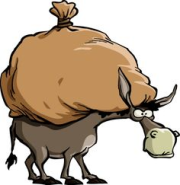Short Version and Long Version: Why Do Those Who Are Bullied Bully Others? Vayishlach & Origins of Bad Behavior
by The7Ways | Dec 1, 2014 | Rabbi Bailey’s Blog |
Why Do Those Who Are Bullied Bully Others?
Vayishlach & The Origins of Bad Behavior
 Genesis 36 yields the fact that a man engaged in incest with his own mother and bore a son named Anah, and that Anah created the mule, something the Talmud views as a negative act.
Genesis 36 yields the fact that a man engaged in incest with his own mother and bore a son named Anah, and that Anah created the mule, something the Talmud views as a negative act.
It seems odd that a man who likely detested his origins would originate another “illegitimate” breeding. However, we find such phenomena in modern-day psychological theories. People who are abused tend to abuse others.
There is a concept called identification with the aggressor, in which a person takes on strong characteristics and behaviors similar to the person who was aggressive towards him or her. People do this to feel strong and eliminate fear of the aggressor (defense mechanism).
Another concept is the repetition compulsion, wherein people get involved in situations that are identical to stressful situations they experienced before.
We must use our free will to turn inward, change our inner feelings and, consequently, change our patterns of behavior.
———————————————————————————————————–
Terminology from academic psychology has made its way into everyday speech over the past few decades. We speak of people being “in denial” or “repressing” something or “having daddy issues.” As arm-chair psychologists, we keenly observe individuals repeatedly getting involved in relationships that are bad for them, with each new partner having the same issue as the last (because we would never do that right? 😉 ). When a child bullies in a classroom, we correctly predict that their father bullies them at home. These observations have become commonplace.
At the same time, though we have such psychological expertise, it seems strange that children would repeat their parents’ behavior. If they themselves found that same behavior so painful, they should want to refrain from inflicting it on others. It is equally strange that a man or woman would not stop dating people who have identical toxic behaviors as their previous partner (or parents for that matter). An observation about Esav’s family and some contemporary psychological insight provide the answers.
A careful reading of Genesis 36[1] yields the fact that a man engaged in incest with his own mother and bore a son named Anah. It also mentions in that chapter that Anah “finds” [=discovers] mules, which he did by breeding a donkey with a mare. This is something the Talmud views as a negative act [2].
[=discovers] mules, which he did by breeding a donkey with a mare. This is something the Talmud views as a negative act [2].
It seems odd that a man who likely detested his origins would originate another “illegitimate” breeding. However, we find such phenomena in modern-day psychological theories. Anna Freud writes about the idea of identification with the aggressor, in which a person takes on strong characteristics and behaviors similar to the person who was aggressive towards him or her. The person does this in order to protect themselves psychologically (defense mechanism) from ongoing fear of that aggression. They try to act strong to avoid feeling like they’ll be victimized again. Anah may have felt victimized and “illegitimate” and in order to protect himself from feeling shame or fear he acted strong through damaging the world by inbreeding species.
Sigmund Freud’s basic idea of identification may also apply here. Children naturally identify with their care-givers and take on their behavior, despite the fact that they often don’t like the behavior. Anah grew up with Esav’s extended family, which was full of incest and strong, aggressive chieftains and hunters. Causing illegitimacy and acting forcefully upon other people or animals may have been a normal behavior to him,  and he engaged in “denial” or “repression” to forget that his being victimized was painful and should not be imitated.
and he engaged in “denial” or “repression” to forget that his being victimized was painful and should not be imitated.
Another Freudian concept helps us understand our conundrum of why a person may keep serially dating the same type of unhealthy partner or the like. Freud writes that people put themselves in similar traumatic or stressful situations because of the repetition compulsion-the psychological phenomenon that makes us forget the awful situation we were in but leads us to re-enact the event. This unconscious compulsion, he originally postulated, is rooted in the desire we have to destroy ourselves.
phenomenon that makes us forget the awful situation we were in but leads us to re-enact the event. This unconscious compulsion, he originally postulated, is rooted in the desire we have to destroy ourselves.
Freud later theorized that people might get themselves into the same situations in order to fix themselves–a “reparative drive.” He saw this as an opportunity to make a different decision that was originally made, thereby changing the original event. After observing the repetition compulsion a great deal in my counseling work, I can say that this appears to be highly accurate.
Although neither I nor Freud profess to be G-d and know the true purpose of the repetition compulsion, we can use it to better ourselves. Our emotional issues and character defects remain until we deal with them, and we keep reliving these situations in order to put ourselves back into them and make different choices[3]. We don’t even need to relive them to grow; once we see ourselves back in those situations we can work on ourselves independently, away from the actual conflict and, by changing ourselves inside, automatically be drawn to different people and situations.
Anah has an awful situation put upon him in that he is a mamzer/result of a forbidden union, which left an intense psychological imprint on him. He decides, in turn, to stamp that negative imprint on something else and to warp creation as G-d made it[4]; he ends up creating an animal that is stagnant in that it cannot create offspring.
imprint on him. He decides, in turn, to stamp that negative imprint on something else and to warp creation as G-d made it[4]; he ends up creating an animal that is stagnant in that it cannot create offspring.
We must remember that it is within our free will to improve our psychology by eliminating unhealthy feelings and bad behaviors. We must become conscious of our repetitive behavior and with whom we have identified in our life. We must emulate Yitzchak (Gen. Ch. 26) in his having the self-control to stay away from Avimelech and his accusatory, aggressive advances. It is not enough to be arm-chair psychologists, we must use psychology to perfect ourselves and emulate our Creator.
– Ian
[1] See Rashi to v. 24 there and Pesachim 54a.
[2] Pesachim, Ibid.
[3] Marriage therapist Harville Hendrix relates this to conflict with one’s spouse, as well. To him, most issues are from the past being re-lived in the marriage relationship.
[4] I say this because Anah’s act is deemed wrong by the sages of the Talmud, and the Torah itself forbids crossbreeding animals. Though this prohibition applied only to the Jews after they received the Torah, it can be seen as revealing G-d ideal goal for creation.



 phenomenon that makes us forget the awful situation we were in but leads us to re-enact the event. This unconscious compulsion, he originally postulated, is rooted in the desire we have to destroy ourselves.
phenomenon that makes us forget the awful situation we were in but leads us to re-enact the event. This unconscious compulsion, he originally postulated, is rooted in the desire we have to destroy ourselves.